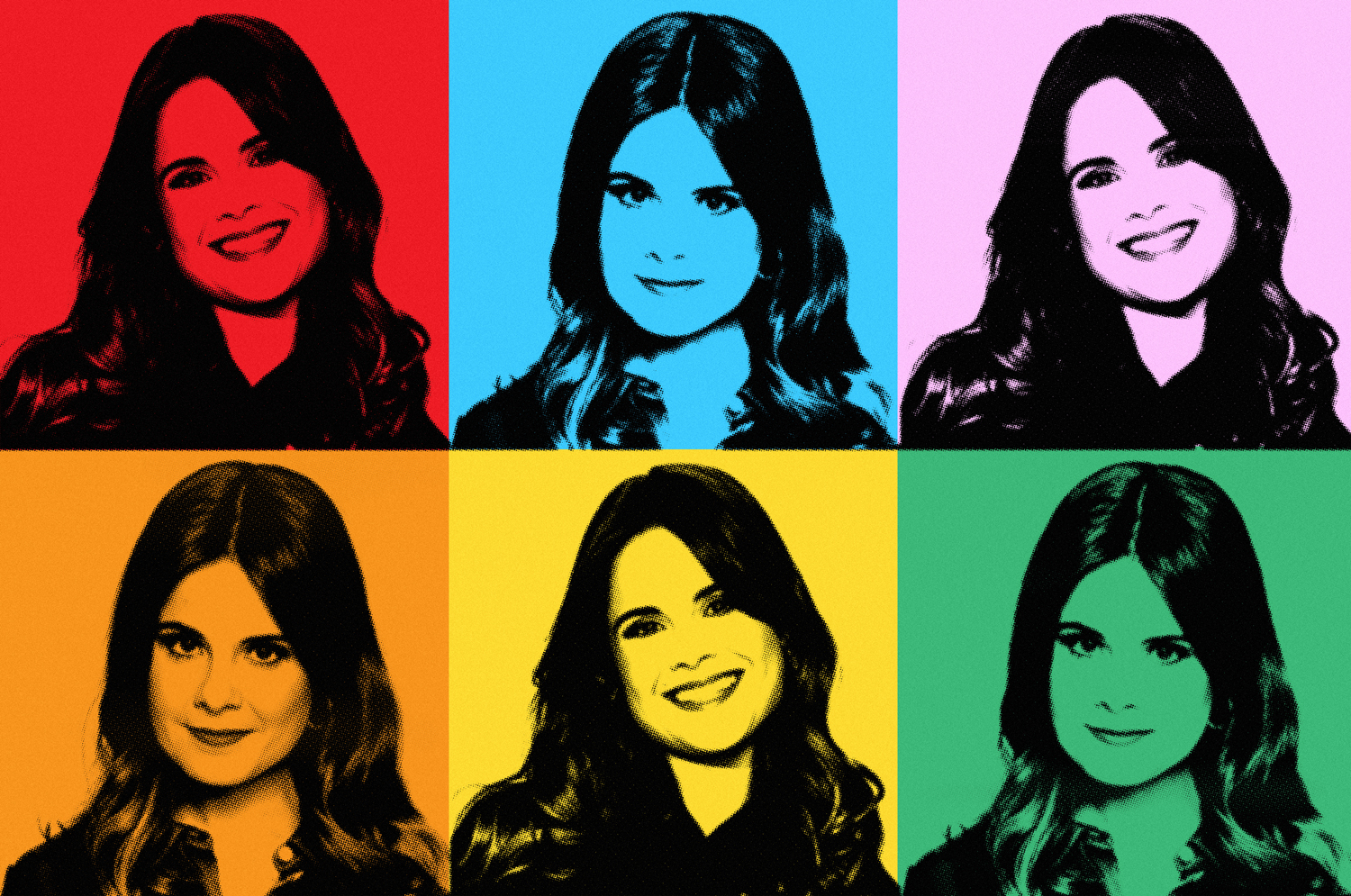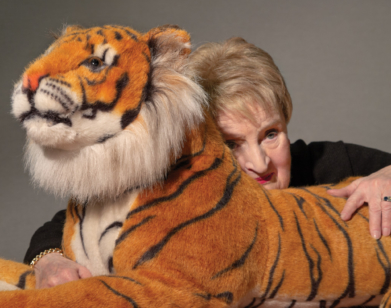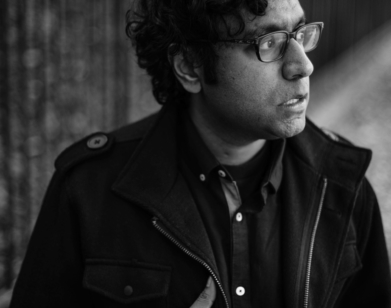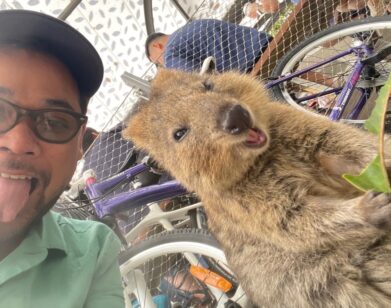Amy Hoggart Gets Personal with Samantha Bee and Her Acupressure Flip Flops

Making people feel good about themselves is no easy feat. It has never been, and will never, be comfortable to face one’s inner demons, punch them in the face, and live to see another day. So when a comedian like Amy Hoggart decides to travel across the U.S. to attack issues that make American’s lives a drag, it’s worth paying attention. In TruTv’s It’s Personal with Amy Hoggart, the British comedian, who perfected her wit and self-deprecating humor in the BBC America’s Almost Royal, seeks to help everyday Joe’s overcome the hurdles of American life in 2020. Although the show tells us that Hoggart has no “real training or a Ph.D. or any actual qualifications whatsoever” (she actually has a Masters in Psychology), she aims to help humans overcome very real problems like anxiety, grief, body image issues, and even Miami.
It’s Personal is rooted in Hoggart’s very personal journey of healing and growth after losing her father. This is why the season finale, airing Wednesday, is all about grief: how to understand it, how to overcome it, and how to laugh at it. Below, the comedian opens up to Samantha Bee, the host of Full Frontal with Samantha Bee and an executive producer on It’s Personal, about her post-quarantine plans, how Hilary Clinton almost ended her career, and the healing properties of acupressure flip flops. —ERNEST MACIAS
———
SAMANTHA BEE: I know we just spoke yesterday, but did you do anything since? Time is nothing anymore.
HOGGART: Do you know what I did? I had three-point five solid hours of nothing. That was what I did.
BEE: It’s a lot of work to try to physically look good if you’re doing interviews and stuff. To be your best self in a Zoom interview—don’t think I’ve nailed it.
HOGGART: Let me be clear, I’m so happy this is just talking because I am wearing the worst outfit. I look really awful. You’d ask me to change if we were face-to-face. It’s too much.
BEE: This is like listening to a podcast. I want to know what you’re wearing. In vivid detail. Please.
HOGGART: I want to make it up and tell you that I’m wearing a ball gown, but my top half is workout clothes, because what if I do want to work out? I won’t, but there’s a chance.
BEE: Are you wearing shoes or is it bare feet?
HOGGART: No! I don’t wear shoes during the day. Do you wear shoes?
BEE: I don’t wear tight shoes. I don’t think that my feet could handle leather or a lace-up, or anything tight. No hard pants. Okay, I’m wearing a fisherman’s sweater, a ripped fisherman’s sweater, and sweatpants. Leopard sweatpants.
HOGGART: That’s such a good look.
BEE: No, it’s not. I assure you, it’s a problem. Then on my feet, I’m wearing acupressure flip-flops and they are bright yellow.
HOGGART: You did acupuncture?
BEE: Sorry, they’re acupressure sandals.
HOGGART: What does that mean? It sounds really nice.
BEE: They’re like a regular looking thong flip-flop but the bed that your foot sits on has nubs on it, of varying height, which is kind of pushing into your feet in an interesting way. I find them very helpful and comfortable. Considering I don’t have body pain right now, like the way I normally do when I’m running around all the time.
HOGGART: I have so many questions about these flip-flops, but I’ve also just remembered might people might be reading about what we say…
BEE: I think they were $10, so I’m going to send you a pair. So let us talk in earnest about what we are here to talk about, which is you, and your show, which is great, and it’s coming to its conclusion. Do you remember the first time that you and I met?
HOGGART: I do. I’m not sure that you would, but it was a big deal for me.
BEE: What do you remember about it? I don’t remember where, I feel like, maybe we talked in a conference room; which is not elegant.
HOGGART: I’d been talking to one of your producers for like six months, and he was like, “It’s annoying you’re not in New York, we’d just get you in.” I was with my mum and her friends in New Hampton. So that day we went to your offices, I went to this conference room and everybody was there, all the top people. I was so nervous, I immediately told everyone, which is true, “I’m not a fan of Hillary Clinton. I really wanted her to be president, she should’ve been, but we don’t have the same politics.” The room went dead. I was like, “That’s the stupidest thing I’ve ever said in my whole life.” I was freaking out and everyone was staring in silence. And then I was asked, “We’re doing this Trump Rally, would you be interested in that?” And that was my audition. That’s how I met you.
BEE: I loved you in Almost Royal. I had already for sure hired you and felt really excited that you were coming in. To me, it was like, “I guess if Amy came in here and was like, an evil person,” or if you were covered in someone else’s blood, I would’ve been horrified and frightened if it was your own blood. “Look, I killed someone along the way. It’s what I do—that’s an Amy Hoggart signature move.”
HOGGART: I love Hillary Clinton.
BEE: No question, she is perfect from tip to tail. It doesn’t make any sense that it took so long to come up with a name for your show. But I think we landed on a really good one. These things take longer than anybody could possibly imagine. I think it can happen that you come up with a title for a show, and then you backfill a concept. But in this case, that did not happen.
HOGGART: We shot the whole thing before we got the title.
BEE: What made you want to do a show about helping people for no other reason than actually helping people? Because you really went into this with the energy of really literally wanting to sort people out.
HOGGART: I do like helping people, but I also didn’t know why anyone had given me this opportunity. I know that sounds like I’m trying to sound humble, but you know how your career is like this: You’re on a late-night show, you’re a correspondent, and someone gives you the opportunity to have your own show. I just felt like, “Why me? Why not anyone else? And why would this show be different?” I was trying to be a psychologist for so long, I thought, “Oh that’s something that is specific to me, so people won’t question whether I got this.” So that’s not a good reason, it’s not very altruistic, but then I did want to help people.
BEE: You studied psychology?
HOGGART: I did a Masters. I had watched the National Health Service for a while, I was trying to help people quit smoking, and I was running a group. I gave people advice about it, even though I’d never smoked. It’s really competitive in the UK to be a psychologist.
BEE: Oh my god, it’s easier to be a performer and a writer in the UK than to be a psychologist.
HOGGART: It is competitive to be in comedy; we both know that. When I had the idea for the show, it was about “Why has no one spoken about mental health?” It was such an obvious idea for a show. What I realize now, having made it is, people probably have had this idea before. But, they realized that it’s too hard because it is so insane to make jokes about people’s mental health.
BEE: At what point did you realize, as you got further into the development of the concept, that it was going to be so hard to execute on the concept? You have to pick the right people, and they have to really pour their heart out to you. What was that process like?
HOGGART: After, the network said “Yeah, we love the premise. We want you to do this. Definitely use real people, have one person per episode.” It was a real problem: “Hang on a minute. You’re gonna get someone on screen to talk about anxiety, and you want people to laugh?” As correspondents, we were making jokes at our expense, and particularly with an expert who we respect. I trained on Almost Royal, where I’m always the butt of the joke, and the audience is laughing at us, so we just did that again. We had to make my character as stupid as possible. That’s how we get through it, but it’s tense, and it’s tricky, and we’re walking a line from the writing process through filming, through the edit as well.
BEE: I think you handled it supremely deftly. I hope that people came away with a genuine feeling that they either learned something, or they were helped in some way, or it was a relief for them to talk about it. Do you think that the interview subjects that you worked with do feel that way?
HOGGART: We decided to interview everyone a few months after filming with them. To wrap it up, and also just to relax the viewer and be like, “Look, they don’t hate Amy.” That’s my favorite part of filming because it is necessary. Honestly, everybody was thrilled to come back. There are varying different strengths of problems: there was a woman who had no sense of humor, a person who suffered anxiety and couldn’t get a job, and a guy who was grieving. Everybody was really helped, and it was very emotional for me. I think people who go on TV to get through a problem or want to change, they’re at the point where they’re ready to go.
BEE: How did you choose the issue that you wanted to tackle on the show? How did you land on talking about shame, body image issues, and grief?
HOGGART: We had a very democratic process in the writing room. We would write little whiteboards; we probably had about 50 ideas. We would vote all the time, we had this really complicated system. That’s how a lot of the episodes came about. Near the end, I took the day off work actually, because my family had come over from London. I emailed everyone, “Hey. Just so you know, I think we should do grief, but I’m not coming in today. So could you guys get started on grief, do you mind?” They all knew that meant I had lost my dad. So a group of really great comedy writers had to kind of flesh out an episode about me losing my dad without me there.
BEE: Was that the most challenging episode for you to film? Because it was more personal—not that any of the subjects weren’t personal, but this was rawer.
HOGGART: Every episode was different in different ways. Everything went wrong in “Shame.” “Miami,” we shot everything on a tight schedule. “Anxiety” we worried that he was very anxious. “Grief,” I did have to put a lot of myself into it, and it just happened that one of my best friend’s father also died that week. I think it was the penultimate episode we shot, so I was just tired, it was a lot. It’s supposed to be funny, it is a comedy show. The whole time I was like, “I don’t think this going to be at all funny.” Now it’s really everyone’s favorite episode.
BEE: I want to ask you this because I do think that I try to learn from the people that I talk to. That’s my favorite part of interviewing people—learning something that I can take away. It’s very selfish. Who do you think, or what do you think, you learned from any of these people?
HOGGART: George A. Bonanno, who is a grief expert, basically is like, “All the group research is wrong.” He spent his whole career proving that we’re all way more resilient at dealing with difficult things than we think. He had the most profound effect on me. But, in terms of the clients, I’m not too sure we’re allowed to do that legally. I learned more about humanity and people’s abilities to change. We’d go on a journey together and I always felt close to them after. In a body image episode, there’s this really crazy bit where in the end, a client called Livy turned back on me. She’s like, “I think that you’re not as confident as you’re saying you are, and I want you to know all these things about you.” You can see that I’m welling up onscreen. Someone said she was way too okay to be on this show.
BEE: How dare her. I love moments like that. Is there something you would still like to do an episode about?
HOGGART: I really would love to do an episode of someone who radically changed their belief. Who left their religion or something like that.
BEE: That would be such an interesting episode. I think the show was great, like a beautiful gem, in a beautiful little wrapped box, with a pretty ribbon on it. I’m going to say my last question, which is totally unrelated to the show: When our period of social isolation is over, who knows when that will be—what’s the first thing you’re going to do when you feel safe to do so?
HOGGART: I want to go back to London, to see people I love. I want to be specifically touched, and I want to go to a restaurant. And maybe lick a railing, or touch my eyes.
BEE: Just go back to licking railings. Go back to prying for gum and chewing it. Perfect.






